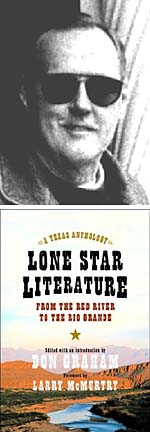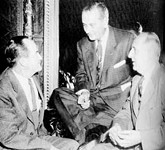The Soul of a Small Texas Town: Photographs, Memories, and History From McDade
Reviewed by Dick Holland, Fri., July 7, 2000

The Soul of a Small Texas Town: Photographs, Memories, and History From McDade
by David WhartonUniversity of Oklahoma Press, 320 pp., $39.95
This photo-documentary in book form is a sometimes fascinating, sometimes more-than-you-need-to-know examination of life as it's lived in McDade, Texas, a small community about 50 miles northeast of Austin. David Wharton is director of documentary projects at the Center for Southern Studies at the University of Mississippi and this unsparing portrait of a dying town has its origins in his graduate work done at UT in the Eighties.
The Soul of a Small Texas Town is a hybrid. The first section of the book is Wharton's photographs, which were taken from 1984-89. Accompanying the photos are his paragraph-long summaries describing the subjects and their social position in the community. For anyone familiar with small-town Texas life, the surprise here is that there are no surprises. Much like the fictional portrait Larry McMurtry drew in The Last Picture Show, the town of McDade is presented as a failed community whose young population either can't wait to leave or, if somehow predestined to stay, appear to accept the town's limitations. The adult population is divided between the "drys," who tend to be fundamentalist church-goers, and the "wets" who, interestingly enough, are called "the street people" because of their weekend habit of gathering on the sidewalk in front of the town's only beer joint.
The second section of the book is a straight historical narrative that presents the McDade of the past as a robust railroad town settled by German farm families. By 1872, just two years after the completion of the Houston and Texas Central rail line, McDade was a bustling boom town that featured a cotton gin, several retail establishments, and a steam-powered corn mill. The railroad was the primary connection between Houston and Austin. Soon McDade was a new financial center that featured a millinery shop, three hotels, several saloons and gambling halls, and traveling entertainments such as tent shows and circuses.
Reconstruction-era Texas was notoriously lawless; McDade was no exception. Ten miles north of McDade lies a hilly area called the Knobs that, after the Civil War, was well-known as a hideout for outlaws. By 1920, however, McDade's outlaw past was nothing but a colorful memory, since by that time it had developed as a conventional Texas town organized around schools, a Lutheran church, a Church of Christ, a Baptist church, and a Black Baptist church. During the first decades of the last century, what linked McDade economically to the neighboring communities of Manor, Elgin, Paige, Lexington, and Giddings was Highway 20, the old road from Austin to Houston. All of this changed drastically with the construction of U.S. Highway 290 that bypassed most of those communities. It is clear that McDade, created by railroad transportation, lost its economic viability because of midcentury America's emphasis on quick and direct automobile travel.
By the time David Wharton arrived in McDade with his camera in the mid-1980s, the decline of the town had pretty much stabilized. His portraits capture the townspeople in places emblematic of their position in the community, with many adults posed at home in the kitchen or in the yard next to a truck or a television satellite dish. Children are often posed at school activities -- outside of school, there is one particularly telling shot of a group of boys with a jam box, listening (according to Wharton's caption) to an Austin rock station, all of them vowing to leave McDade as soon as they're old enough.
McDade's annual celebration is the Watermelon Festival, a tie to an agricultural past that has largely disappeared. Like an astute anthropologist, Wharton uses the festival to typify McDade's two factions -- the teetotalers who emphasize the festival's coronation of the Watermelon Queen and the beer drinkers who run the outdoor dance. Most telling of the town's decline is that McDade schools now only extend through the sixth grade -- several of the girls in town say they can't wait to go to junior high and high school in Elgin or Bastrop, where the cute boys are.
Dick Holland is the editor of Larry L. King: A Writer's Life in Letters, or, Reflections in a Bloodshot Eye.










